DULUTH — Inevitable changes are down the road for the local automotive industry as Minnesota gears up to either adopt California clean car standards or follow federal environmental standards — a choice presented under the Clean Air Act.
Although the Minnesota Auto Dealers Association filed a lawsuit in the State Appeals Court to challenge Gov. Tim Walz's adoption of California's standards in 2022, the case was not taken up by the U.S. Supreme Court.
A regulation will go into effect next year that requires auto dealers to stock approximately 14,000 new electric vehicles throughout Minnesota.
Since California updated its regulations to ban the sale of new gas- and diesel-powered engines in 2035, Minnesota has the option to allow its current mandates to expire in 2025, thus defaulting to federal regulations.
Under the Biden administration's proposed Environmental Protection Agency regulations, it is possible that 66% of new cars sold will be electric within nine years.
ADVERTISEMENT
Dealerships gauge EV market
Some auto dealerships in Duluth report a slowly increasing interest in EVs, especially as the option gains popularity with drivers in metropolitan areas.
"We're starting to see more EVs on the road, and I think it's only a matter of time before they make their way up here," said Danielle Helser, delivery specialist at Kia of Duluth.

Contributed / Kia of Duluth
There was one fully electric option for sale at the dealership Oct. 26. The 2024 all-wheel-drive EV6 Wind SUV was listed at $55,600 — about $20,000 more than a similarly sized and featured gas vehicle, Helser said.
Kia also offers the Niro EV. The EV9 SUV will arrive soon at the base price of $54,900, she said.
Duluth's NorthStar Ford had nine EVs on hand recently and six more on the way from the factory. Available models include the Ford F-150 Lightning and Ford Mustang Mach-E, which is most comparable to the Ford Escape, but costs about 10% more.
Test drives of EVs at the dealership have risen 25% in the last few months, according to NorthStar sales consultant Russell Joldersma. In early 2020 to 2021, he said, there was curiosity and excitement surrounding EVs at the dealership, but that tapered when people learned they weren't readily available.
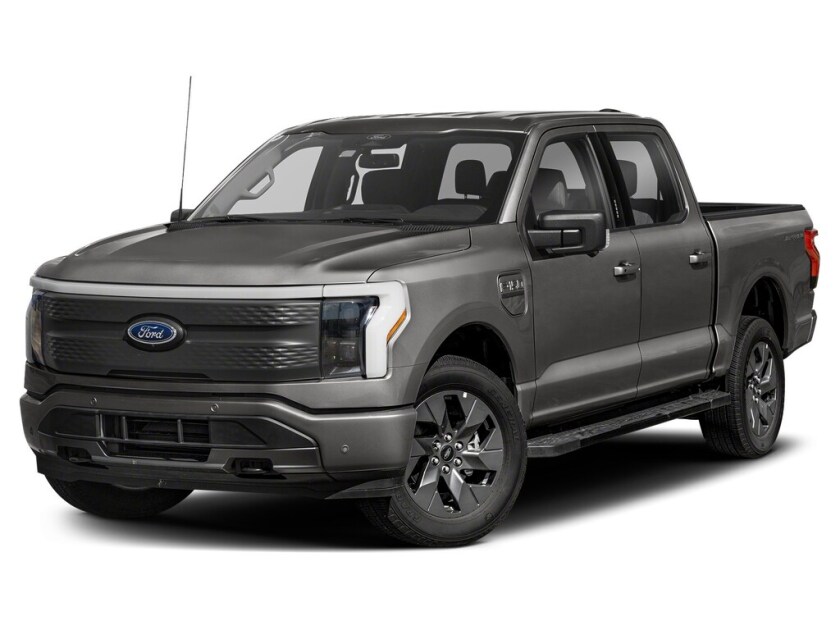
Contributed / NorthStar Ford
By scaling back the availability of luxury features, such as massage seats and LED lights, Ford's supply of electric vehicles has improved at the dealership. Joldersma said his customers have become more open-minded about the concept of EVs, although the price point remains a barrier.
During Benchmark Mineral Intelligence's recent Energy Transition Commodity Outlook event, principal consultant Mark Beveridge noted that battery cells are about 25% of an EV's cost.
ADVERTISEMENT
"The new technology doesn't come too inexpensively," Joldersma said. "Rebates bring more interest. Manufacturers like Ford, for instance, are offering pretty attractive rebate packages of about $5,000."
Kia's South Korean-made EV models don't qualify for a tax credit under the Inflation Reduction Act's new battery sourcing requirements, but customers could tap into a $7,500 leasing rebate loophole, Helser noted.
Meanwhile, oil-free EVs require less overall maintenance than combustible engines because there are fewer moving parts, according to area dealerships. Kia of Duluth and NorthStar Ford each have three EV-certified technicians on staff.
"I've noticed that the customers who are interested in fully electric are very knowledgeable and do a lot of research before coming in," Helser said.
Common misconceptions that the dealerships hear relate to the battery life of EVs in cold Minnesota winters.
"Most of the batteries we get at Kia of Duluth are insulated," Helser said. "I have not heard of any issues with the vehicles to start in the cold."
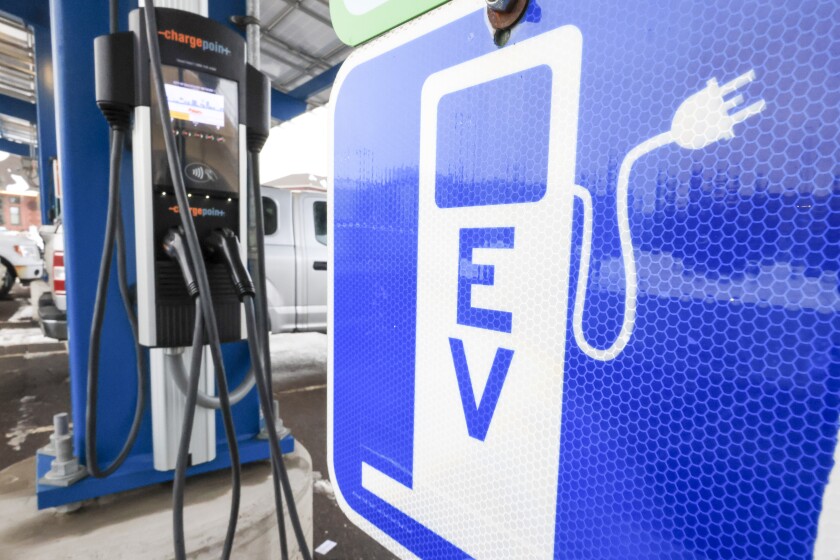
Clint Austin / 2023 file / Duluth Media Group
Joldersma added, "As the range gets better, I hope that ease of use gets better. Duluth has many stations, but there are worries about range — especially in rural Minnesota, on the Iron Range or out west in the state."
Fully electric vehicles make up a "very low" percentage of the local Kia dealership's overall passenger car sales, Helser said.
ADVERTISEMENT
According to asset management company VanEk , global EV sales registered in 2022 saw a 60% increase over 2021, making up 14% of all new car sales (up from less than 5% in 2020). China captured 60% of the market, followed by the European Union and the U.S.
EVs’ market share of U.S. vehicle sales has increased from 3.2% in 2021, to 5.7% in 2022, and to 7.0% in the first half of 2023, VanEk reports.
Sourcing materials for EV locally
Inflation Reduction Act data finds high importance of minerals such as copper, cobalt, nickel, lithium, rare earth elements and aluminum for electric vehicles and their supporting infrastructure. According to investment banking company Morgan Stanley, the country's net reliance on nickel and cobalt between 1993 and 2022 was in the 50%-80% range due to their limited domestic production.
Nearly 60% of nickel sulfate is refined by Chinese companies, according to Benchmark principal analyst Will Talbot, which enables its influence on market dynamics, pricing and availability.
The Inflation Reduction Act's prohibition of "Foreign Entities of Concern" limits Chinese tonnages.
The Inflation Reduction Act authorized $391 billion for climate change and domestic energy production. It included targeted tax incentives to promote the manufacturing of U.S.-sourced materials, such as batteries and electric vehicles.
"The law includes some of the strongest labor protections and incentives ever attached to clean energy tax credit programs and will build American clean energy supply chains by incentivizing domestic production in clean energy technologies," said Rachel Johnson, president and CEO of the Area Partnership for Economic Expansion, or APEX. "Minnesota’s manufacturing and supply chain, and specifically those in our region, have the opportunity to benefit from the cascading effect of this demand."
Benchmark chief data officer Caspar Rawles said the battery market will account for almost half of the global demand for nickel by 2035.
ADVERTISEMENT
"Because our nickel in Minnesota is so high-grade and highly concentrated, it takes less energy to turn it to battery-grade material," said Todd Malan, chief external affairs officer and head of climate strategy at Talon Metals Corp. "In Indonesia, it is very low-grade, and you have to scrape basically the top 50-100 feet of rainforest to get that nickel in an open pit mine, rather than an underground mine.
"More importantly, because it's low-grade, it takes a lot of energy to concentrate it to the level of battery-grade nickel," Malan said. "So the embedded CO2 footprint of Indonesian nickel versus nickel that you get from Minnesota, Michigan, Australia or Canada is 50 times what we would produce in the U.S. It's a big difference."
The goal of Talon's Tamarack Nickel Project in Aitkin County, which is in the developmental stage, is to provide a domestic source of nickel for U.S.-made EVs.
Talon estimates it will produce 15%-20% of nickel in the U.S., Malan said.
The company is contracted with Tesla to supply 75,000 metric tons of nickel in concentrate, which Tesla will refine for domestic battery use. That's 60% of Talon's projected production, Malan said, which is anticipated to begin by 2027.
Talon's nickel would appear in EV batteries by 2028, around the same time a shortfall in nickel is forecast with the Eagle Mine running out of order in Michigan, Malan noted.
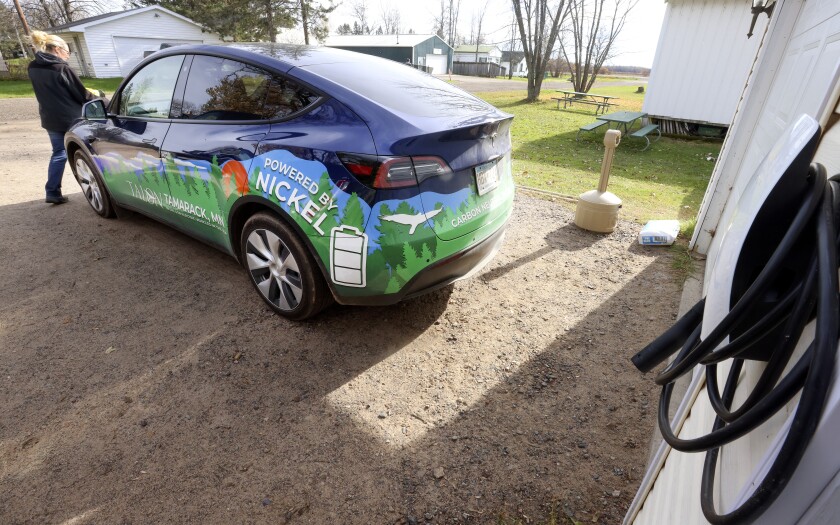
Steve Kuchera / File / Duluth Media Group
"It's an aggressive timeline. We're hoping that we can reassure the public that we can both protect the environment and do this extraction," Malan said.
Talon is ramping up exploration near Big Bay, Michigan's Eagle Mine, which is the country's only operating nickel mine but has a mine life expected to end in 2026.
ADVERTISEMENT
The Biden administration has so far supported Talon, but it has challenged two of Minnesota's other proposed copper-nickel mines, refusing to renew key federal leases for the Twin Metals' copper-nickel mine near the Boundary Waters Canoe Area Wilderness and instituted a 20-year moratorium on mining on 225,000 acres of federal land in the same watershed as the BWCAW.
Talon's Aitkin County project faces opposition over fears that it could pollute the Mississippi River watershed.
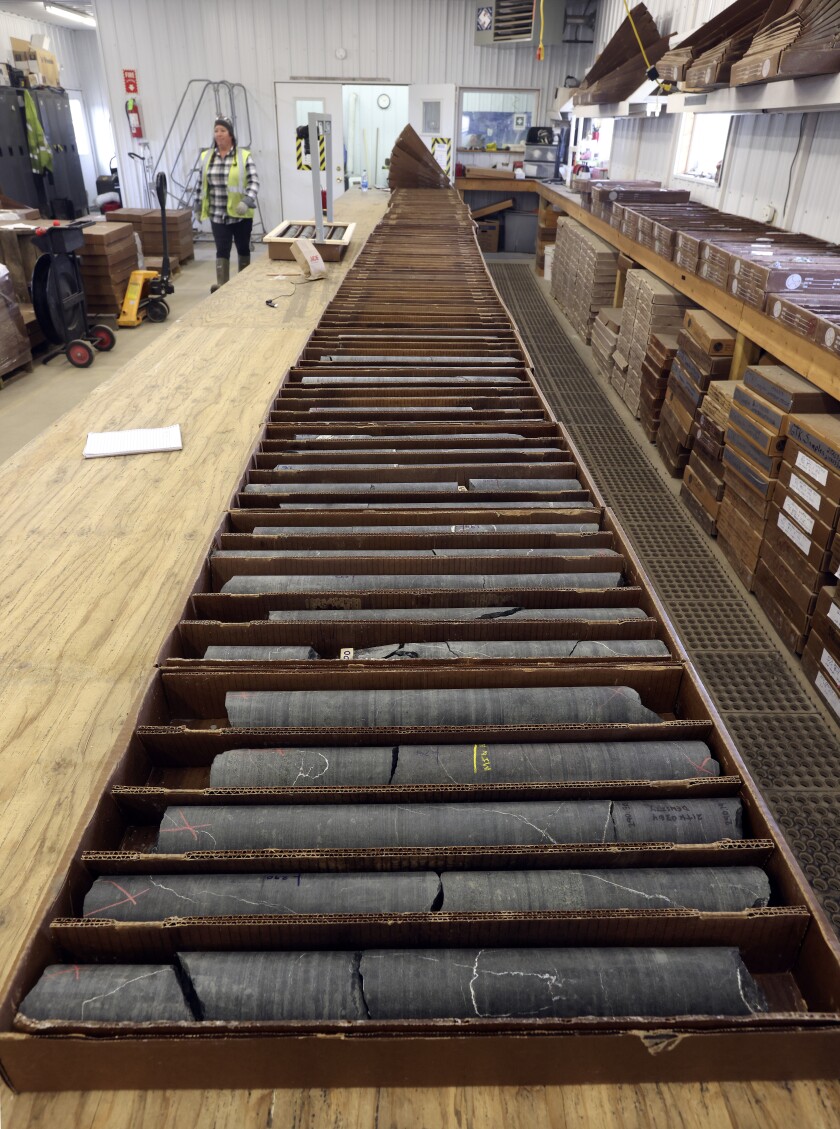
Steve Kuchera / File / Duluth Media Group
Mille Lacs Band of Ojibwe Chief Executive Melanie Benjamin said in a statement in June that the band was concerned with the mine being so close to its land and "supports transitioning to a green economy, but in a way that does not cause further harm."
"This is the beginning of a long environmental review process. The Band is committed to coordinating closely with the state of Minnesota to conduct a thorough evaluation of potential impacts and ensure that our land, water, wild rice, and people are protected," Benjamin said. "As a sovereign nation, the Mille Lacs Band must have an equal voice in this process and is entitled to equal protection."
Talon said that it will treat water that seeps from bedrock into the mine. Additionally, no ore will be crushed or processed on-site.
Its processing and waste storage moved to a drier environment in North Dakota to demonstrate the company's willingness to address such environmental concerns, Malan said.
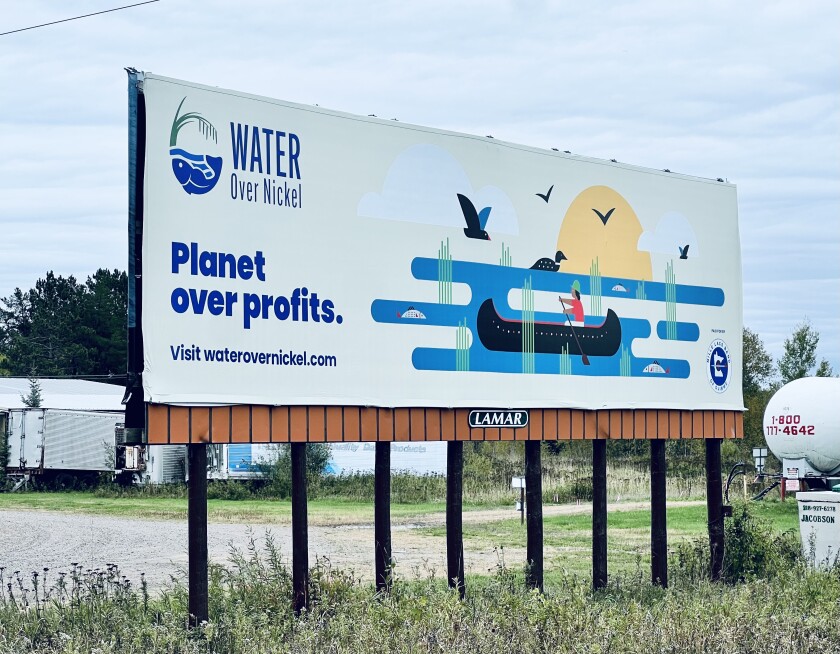
Brielle Bredsten / Duluth News Tribune
"We are seeing more national attention from Fortune 100 companies, such as Ford, weigh in on the need for a more sustainable supply chain," said Johnson, of APEX. "We’re also seeing the adoption of products and solutions where consumers believe their choices mitigate climate change — specifically, electric vehicles. What we haven’t seen just yet is the full circle connection to the importance of deriving those minerals required for their choices locally and in a responsible manner."
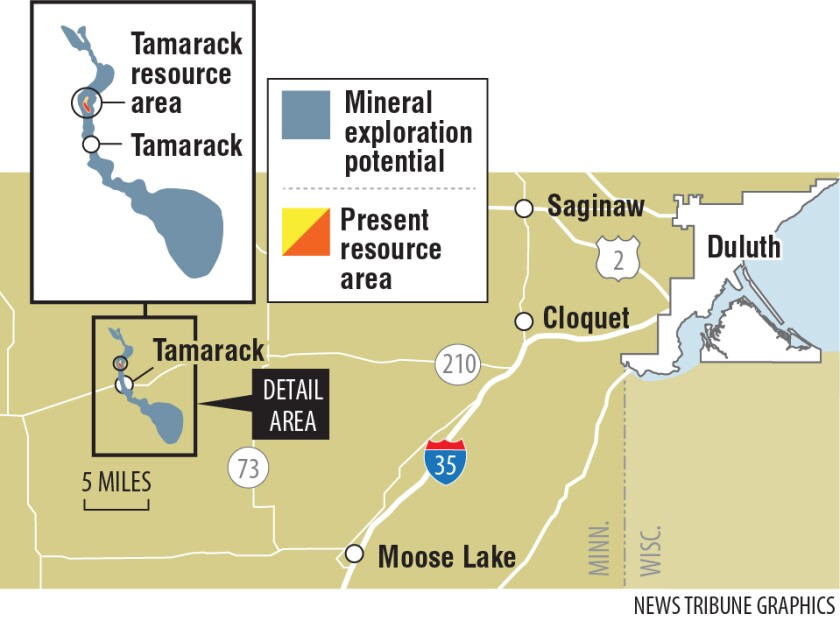
Gary Meader / Duluth News Tribune
"What people may not realize is that the nickel we want to take out of the ground in Minnesota for batteries is infinitely recyclable. Once you have it in the system, it can go into generations of future energy systems," Malan said.
ADVERTISEMENT
Talon is working with battery recyclers to ensure its tracking and tracing systems are compatible, and that nickel produced at Tamarack can be used in U.S.-produced EV batteries and recycled in the future.
"We're contributing to the supply chain for batteries that help with the energy transition, which is addressing climate change — but we also don't want to negatively impact the environment while we're trying to save it," he said. "It doesn't have to be a choice between getting the materials out of the ground and protecting the environment."
"auto" - Google News
November 01, 2023 at 07:00PM
https://ift.tt/tGc4yJQ
Northland auto dealerships provide insight into electric vehicle market - Duluth News Tribune
"auto" - Google News
https://ift.tt/LeuGvrR
https://ift.tt/BWLOsn1
Bagikan Berita Ini














0 Response to "Northland auto dealerships provide insight into electric vehicle market - Duluth News Tribune"
Post a Comment